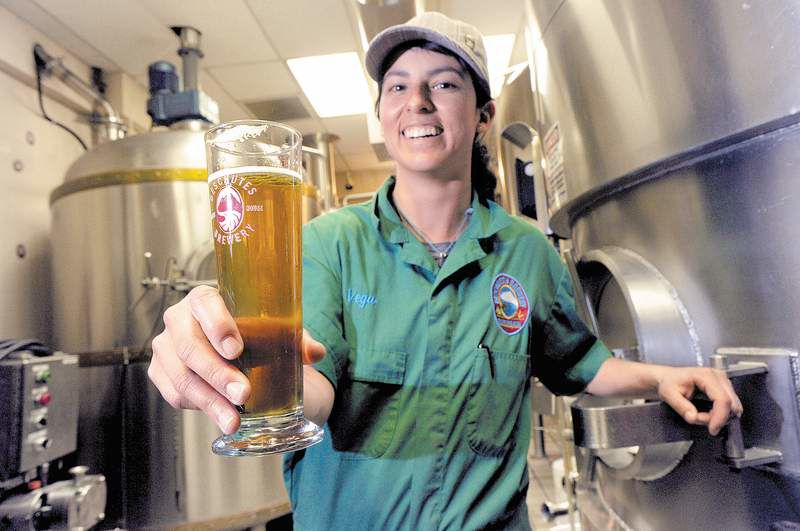Promoting a gluten-free beer
Published 5:00 am Wednesday, August 3, 2011

- Veronica Vega, a brewer for Deschutes Brewery, holds a glass of gluten-free beer currently exclusive to the brewery’s Bend and Portland brewpubs.
Gluten-free beer, which has been sold exclusively at Deschutes Brewery’s Bend and Portland brewpubs in recent years, could be commercially distributed in 18 states next year.
Brewmaster Larry Sidor said he has brewed and sold gluten-free beers since 2005 at the pubs, which he considers research and development labs. About six months ago, the company decided to focus on a gluten-free Northwest pale ale, which uses brown rice and sorghum instead of more popular beer-making grains such as barley and wheat.
Trending
The brewery plans to sell the beer in the states where it distributes once it has the capacity to add it. At present, the company is at capacity at its west Bend production facility, where it brews and bottles its top sellers, such as Mirror Pond Pale Ale, Black Butte Porter and Inversion IPA. The company is expanding its production facility to increase capacity.
Sidor said he was inspired to create a gluten-free beer because a professor he knows told him he wasn’t impressed with the ones available.
“I said, ‘Well, you know, I think I can do better,’ and so I’d make a keg and I’d send it down to him, and he would give me the thumbs-up on it,” Sidor said. “He was one of my bigger cheerleaders.”
The brewery took the beer to the 24th annual Oregon Brewers Festival in Portland, held last Thursday through Sunday. The event attracted approximately 80,000 people.
Chris Crabb, the festival’s media director, said over the past two to three years people have asked her, online and offline, about whether a gluten-free beer would be on tap.
Crabb said she proposed the inclusion of a gluten-free beer to the festival’s committee, and the festival’s beer engineer, Teddy Peetz, chose Deschutes’ Gluten-Free NWPA.
Trending
“Basically, because we weren’t sure how many kegs we would pour, we wanted to go with a local product,” Crabb said. “Deschutes is a good gluten-free product, first of all. But secondly, that way, if it was not successful, we could return the kegs to them, and they would still be in good shape, and it wouldn’t be a loss.”
Returning kegs wasn’t necessary. All eight kegs of the beer were tapped out over the course of the festival, Crabb said.
Jason Randles, the brewery’s digital marketing manager, called the beer’s performance at the festival encouraging. But the brewery already knows demand exists for the product, he said.
“We’re not expecting it to … take over Mirror Pond as the No. 1-selling beer, but our sales team has done the forecasting to know what they think we can do when we’re ready to go, and it’s decent enough that it makes us want to go after it,” Randles said.
If Deschutes brings the gluten-free NWPA to market soon, it will likely ride the wave of a national trend in gluten-free products.
Increasing awareness of gluten, and how people negatively react to it, has been growing in the past decade, and so has the market for gluten-free products. People with celiac disease can have an adverse reaction when they eat products with gluten. The nonprofit Celiac Disease Foundation estimates that one in 133 people in the United States have the disease.
In the United States, more gluten-free beers have popped up on the market. Now gluten-free beers are available from England-based Green’s, Minneapolis-based Bard’s Tale Beer Co. LLC and other companies. Anheuser-Busch InBev, headquartered in Belgium, produces Redbridge gluten-free beer. And in Portland, Harvester Brewing LLC, which intends to open a gluten-free brewery in the city, recently applied for a brewery license from the Oregon Liquor Control Commission.
Currently, between 15 and 30 percent of the population has an interest in gluten-free products, said Mieke Johnson, owner of Tula Gluten-Free Baking Co., which recently closed its commercial kitchen in southeast Bend. It sold gluten-free baked goods wholesale to local coffee shops for about a year, she said. Johnson recently moved to Portland to open a gluten-free location there.
In addition to people with gluten allergies, the percentage range factors in people who cook gluten-free food for relatives or roommates, as well as high-performance athletes who prefer it because it’s easier to digest and more sustainable for the body, she said.
Johnson said when she went gluten-free about eight years ago, she didn’t know many others with the dietary restriction.
“But then in the last … four years, I’ve seen a real increase in the number of bakeries as I’ve traveled around,” Johnson said. “(There are) a lot more products in the last two years on the market and especially the last year. It’s just really been a big increase.”








